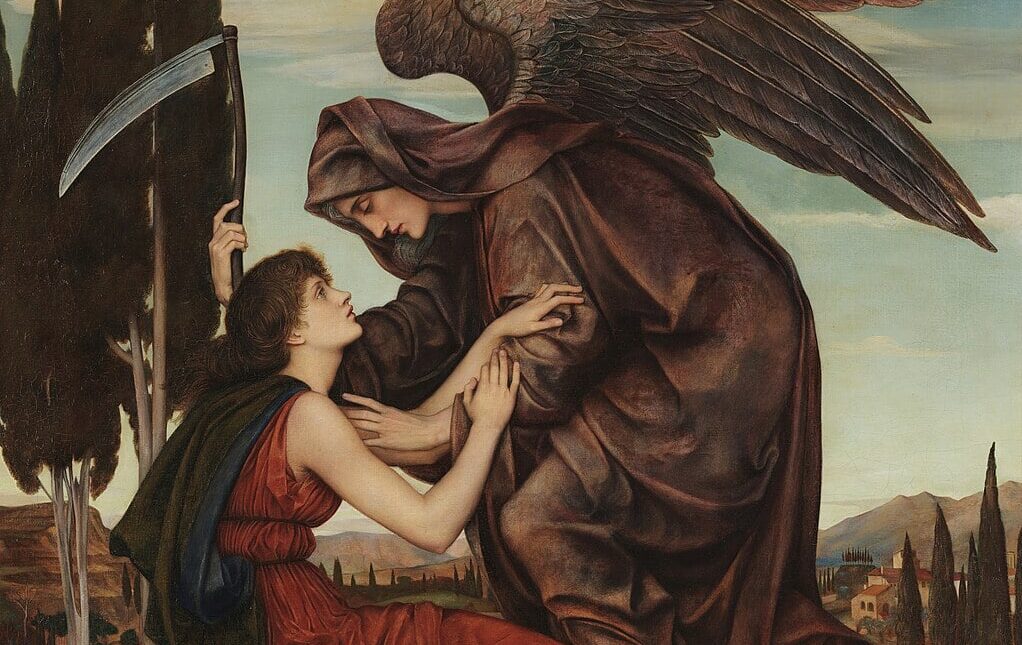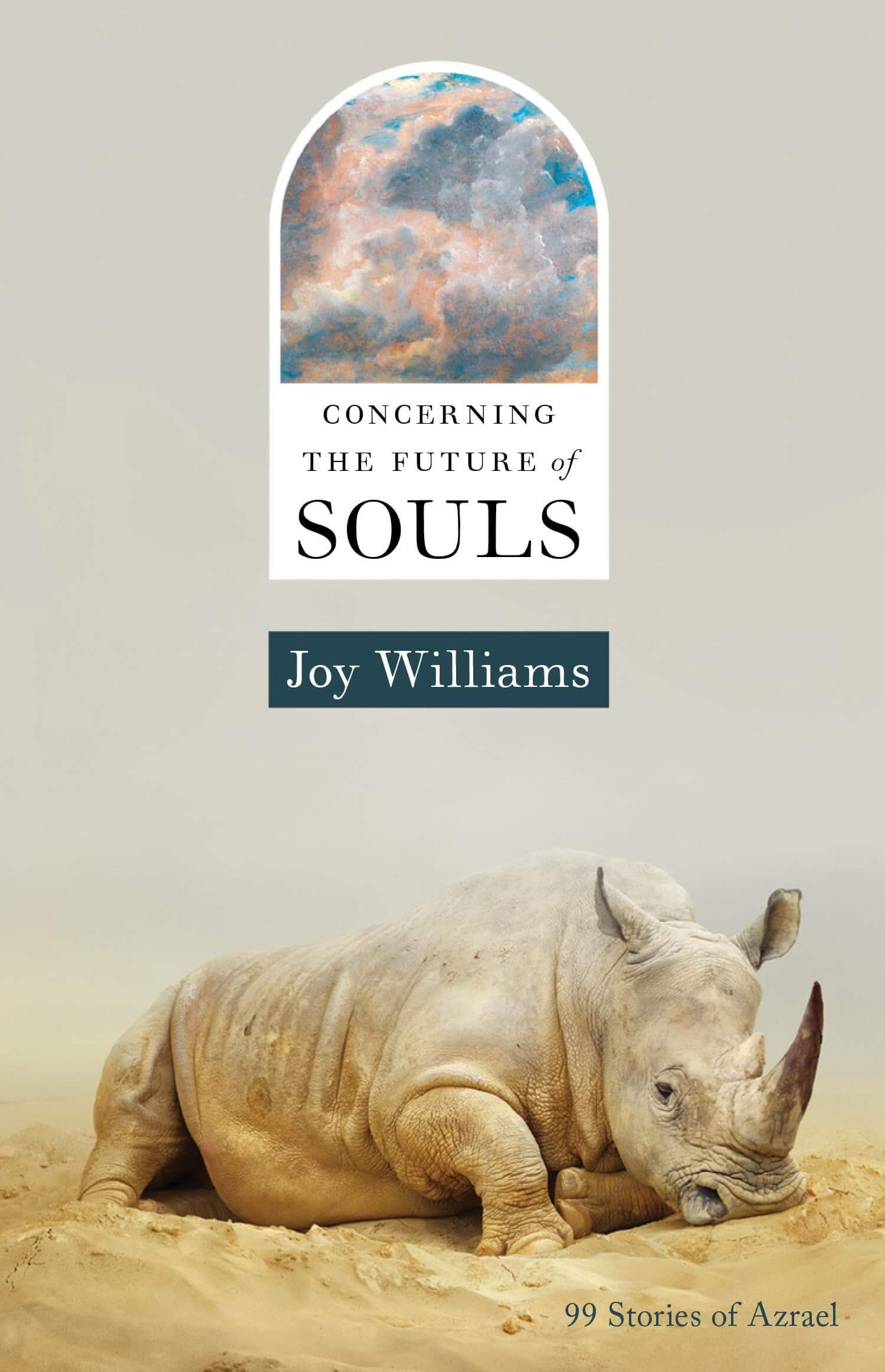As the writer Joy Williams strolls the beef barn at the county fair, she notes mournfully the lovely eyelashes of the future filets mignons. “There’s such a disconnect here,” she says. While charmed by the farm animals of southern Michigan, she knows where this story ends: the dinner table. The knife. She’s a vegetarian and defender of nonhuman life from cattle down to the mosquitoes in the Florida mangroves, and as she watches fairgoers stroke velvety bovine snouts bound for the butcher, what she sees is death done wrong. Tons of it.
That was 2017, during a stint as a visiting writer at Hillsdale College. Then, Williams was promoting Ninety-Nine Stories of God, a book of often bizarre, borderline absurdist vignettes about God entering earthly situations awkwardly: applying to adopt a turtle, wrong-footing human hosts for asking why they’ve polluted his “living water,” trying to run with wolves. They’re short enough—often no more than a paragraph, with the title listed at the end as a punchline—that the more successful ones would come off like a standup comedy routine if the themes they address weren’t as profoundly unsettling as they are amusing. The unexpected form and subject matter seem intended to make the familiar unfamiliar: the person and personality of God, the divine interacting with His creation, the surprisingly tricky question of what storytelling even is, and is for. Next came Harrow, a novel about an aspiring ecoterrorist in a dystopian future in which most of the natural world has perished in a climate crisis.
Her latest work stars the Angel of Death himself. Concerning the Future of Souls follows the unusual vignette structure of Ninety-Nine Stories of God and adds God’s trusty sidekicks to the list of characters. Azrael, the angel tasked by the Creator with carrying souls to the afterlife, appears alongside Satan, who is skeptical of the viability of the enterprise in an age of mass extinction. The two dark angels fight and speculate and mourn as the living seem less to die than to fade into oblivion—to lose the will to or knowledge of how to live. If death truly has gone wrong, perhaps what comes after will do the same.
Azrael has “four thousand wings. This was simply a fact. The feathers of each wing—innumerable. As they should be. The wings sheltered the souls so they could not be viewed in transit. This too was correct. He also had a thousand eyes but not, as has been rumored, four heads.” His name and duties come from the Quran, though Christians and Jews have borrowed him on occasion as their Angel of Death. After Death visits a creature, Azrael removes its soul from its body and gently bears it away—to heaven or somewhere else. Williams’s Satan finds this job rather pathetic, but even the archfiend can’t help becoming rather fond of Azrael. Death’s angel is professional in his work, blindly loyal to his Boss, and worried about his charges but powerless to help because life keeps disappearing on larger and larger scales: “The forest had been a living being and now it was not. Azrael felt a little sick. He was still more or less on time with humans but was finding it harder and harder to keep up with everyone else.”
Yes, trees and octopuses and sharks get to be ushered out of life, too, though unlike human beings, the vanishing vegetable and animal hordes await no future judgment. Williams, who roams broadly among religions, takes this eschatology not only from Muhammad but from John Duns Scotus (in a section entitled “Dunce,” she traces the origins of the titular cap with considerable irony). The Franciscan friar’s Haecceity, the “thisness” of every thing, and Univocity or “Oneness of Being” became “quite the opportunity for mirth” among Renaissance humanists, but Williams thinks there’s something to them despite their fall from favor among the West’s dominant strain of anthropocentrists.
Yet theology is poor consolation for the dismal state of things. Satan drags an increasingly preoccupied Angel of Death out for drinks, declaims with Miltonian pride about his favorite depictions in art, rants about his falling-out with the Creator (“God had let jealousy overcome Him. Pique!”), and needles his companion about his naïveté regarding man’s fate. He emerges as the more thoroughgoing climate skeptic of the two:
Other forms of being becoming unavailable are they? Extreme Biodiversity loss? Species winking out right and left. 70% of this gone. 70% of that. It adds up.
Sadness descended upon Azrael. His many eyes closed for a moment. His feathers trembled.
But I must have faith that this is intended, he thought.
Human beings, too, are no longer following the divine plan. More and more often, Azrael arrives at bodies after death and finds them, horribly, empty: “Could it be that souls are leaving a person before the body dies?” he wonders. “I’ve been noticing a falling off in the customary process. . . . Azrael looked so anguished that the Devil said formally, Truly, I take no pleasure in this. But privately he thought, mice fleeing a sinking ship . . .”
The loss of the soul—before death, before even a chance at hell’s fiery form of oblivion—is so impossible for God’s trusty ferryman to comprehend that many of his eyes seem simply to reject the sight of it: “They were not encrusted or inflamed, just shut, firmly shut.” To Azrael, the deviation from the traditional cycle of life and death is the most sorrowful mystery, God’s most bewildering concession to his creatures’ free will—unless that, too, is disappearing.
Satan sees things more cynically. The entire system is tottering, not in the glorious way he fell, but pathetically: “The whole apparatus that Azrael embodied, enabled actually, was rickety, not built to last,” he thinks. For Williams, extinction transforms the end of life from a kind of consummation—a continuation of life in another form—into a state of nonbeing. It throws nature off its course.
Should Azrael give up the ghosts, then? At the end of the book, Satan doesn’t receive a visit from the angel for a time and wonders. “But then he appeared returned once more. Improbable glorious weary sorrowful. Still rejoicing, though the tiniest bit less.”
Concerning the Future of Souls is about more than mass extinction: eternity, friendship, the age-old question of divine indifference. But the overarching narrative is centered on extinction’s metaphysical consequences. Over the decades, in both fiction and nonfiction, Williams has come to think of little else. Her environmentalism and her writing are symbiotic. Her challenge to anthropocentric humanism is cosmic.
Williams’s ontology evades stereotype. She’s against narrow-minded humanism, certainly, but whether she’s anti-human is a complex question.
Her views aren’t those of the wild man Edward Abbey, to take one prominent contemporary as an example. Abbey became notorious for inspiring nature writers and ecoterrorists alike with his literary and literal acts of rebellion against the developers and highway-pavers bulldozing his beloved Southwest. A few years before Joy Williams began to wrangle her environmentalism into her fiction, Abbey was tearing up survey markers and chopping at billboard posts to protest the urbanization of the desert. And when he wrote The Monkey Wrench Gang (1975), a rowdy ecoterrorist thriller whose autobiographical qualities were as interesting as its literary ones, it was no secret that he had tried a lot of the gang’s antics at home. The novel helped to inspire the Earth First! movement, whose members engaged in everything from stunts like rolling a fake crack down the Glen Canyon Dam (Abbey’s nemesis) to sabotaging construction machinery. It gave anti-green Americans a convenient stereotype for environmentalists as anarchists and an excuse to dismiss their concerns.
Abbey, who died in 1989, advocated a particularly assertive version of what would today be called “degrowth”: break the dams and tear up the highways and the natural world will restore itself. Forget about globalization and industrialization: from Wall Street brokers in their cubicles to farmers in John Deere combines, everyone should live off of the land as he did in his memoir Desert Solitaire (1968), working at a national park in Utah. Otherwise, urban expansion and environmental destruction would lead to a world like that of Williams’s Harrow—lifeless and as ruthless as Abbey believed denatured humans to be. He and more so his followers were uninterested in subtlety, opting instead for bombast (and sometimes bombs).
Williams does not work in such a dramatic, or martial, key. She’s more of a “rewilder”: as her neighborhood in the Florida Everglades became more suburban, she built a cement wall around her home, turning it into a compound where mangroves grew wild and the swamp attracted birds and insects that had been nearly forced out of the area. More than she wants to have a go at the Man, she wants man to let go.
What Williams opposes is the upheaval of the natural world and its patterns that development causes. “Save the Whales, Screw the Shrimp,” from her 2001 nonfiction collection Ill Nature, lays out the contradictions of the “enlightened” consumer who buys a home in a “MASTER PLANNED COMMUNITY” in the suburbs—the “tiny masters” of course being the developers who have sculpted nature, in parks, golf courses, nature “preserves,” for owners’ pleasure: “Nature becomes scenery, a prop.”
“The ecological crisis cannot be resolved by politics. It cannot be resolved by science or technology. It is a crisis caused by culture and character, and a deep change in personal consciousness is needed,” Williams writes. “You have made only brutal contact with Nature; you cannot comprehend its grace.”
What she can’t abide in literary terms is similar: the way attempts to create freedom by controlling nature limit our ability to welcome the unexpected, in our own lives and in the ways we see others, and crowd out nature itself. Dogmatists lose their sense of humor because comedy is rooted in delight at the different, the unpredictable, that which falls outside one’s expectations and conventions.
This makes them blind, Williams believes. What one denies when one limits oneself to ideology, whether anthropocentrist, capitalist, or even some forms of environmentalist, is the role played by fate—uncertainty, chance—in determining the course, and ultimately much of the meaning, of one’s life. Assigning the world to rigid, overdetermined political categories removes the element of surprise that gives the happy ending its sweetness and the tearful finish its bite.
This is where Concerning the Future of Souls surpasses Williams’s recent green-tinted work, especially in Harrow. In that novel, Williams makes the disturbing proposition that after the climate apocalypse human beings will not only not learn their lesson but will turn on nature as precisely the cause of their problems: “Bouncing back from such historical earth-caused losses, humankind had become more frightened and ruthless than ever,” one character thinks. “Nature had been deemed sociopathic and if you found this position debatable you were deemed sociopathic as well and there were novel and increasingly effective ways of dealing with you.” This is in fact a distinct possibility, and an astute prediction that could have anchored a critique-in-fiction about the more short-sighted and starry-eyed strands of environmentalism. Who says people will learn their lesson? Who says climate-based breakdown would change anyone’s mind if one’s political program is based on fear and not persuasion? But unlike the often humorous Ninety-Nine Stories of God and Concerning the Future of Souls, the tone of the passage, and of much of the book, is so humorless, so climate-obsessed, that eyes roll instead of tears.
But as her latest book shows, Williams knows better. “What a story is, is devious,” Williams told the Paris Review in 2014. “What good stories deal with is the horror and incomprehensibility of time, the dark encroachment of old catastrophes.” Concerning the Future of Souls returns to these themes with Williams’s characteristic deviousness: she centers on the Deceiver himself to demonstrate human beings’ increasing blindness to the strangeness of the supernatural and its always unexpected manifestations. The truly radical suggestion of the book is that the existence of the Father of Lies is not our deepest problem, but our inability to see him or his counterparts, angelic and divine. This blindness profoundly affects the fate of the book’s human souls, and their angelic interlocutors. And it can lead to not just death but annihilation.
This is where the “dark encroachment of old catastrophes” emerges from beneath Williams’s deceptive, often droll storytelling style. In a vignette toward the close of the book, Satan convinces Azrael to play an old game, translating a famous poem by the dying Hadrian often rendered something like this:
Poor little, wandering, charming soul
Guest and companion of my body,
What place will you go to now?
Pale, stiff, naked little thing,
Nor will you be making jokes as you always do.
Azrael hates this game; he can never bear to face the helplessness and hopelessness of those closing lines, with the souls having tragically lost their spark of life, their sense of humor. And it is shocking, even terrifying, to consider the possibility that, now and in the final reckoning, one could be cut off from the full humor, and horror, of the cosmic drama. Questions of religious belief aside, this is sad; for those who ascribe to a religion whose end is the Beatific Vision and human participation in divine eternity, it’s a new vision of hell. It’s enough to make one wonder, with Williams, about the future of one’s soul.















